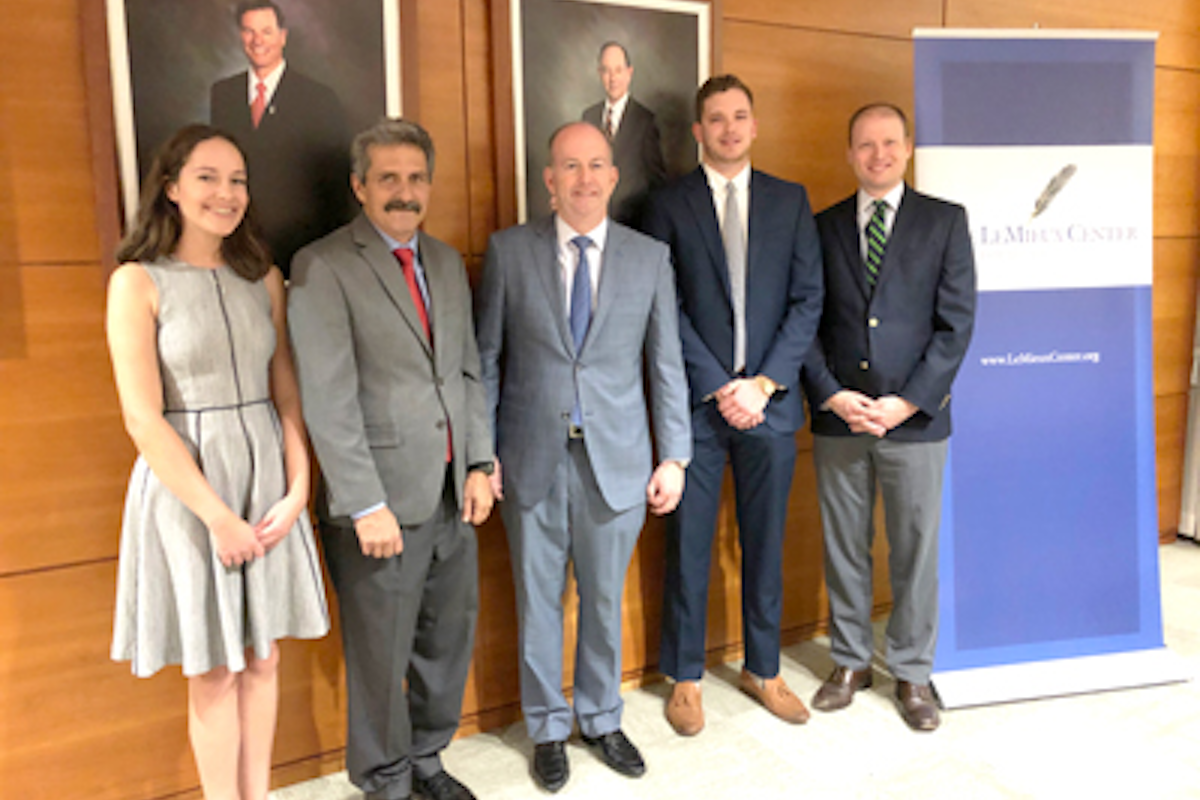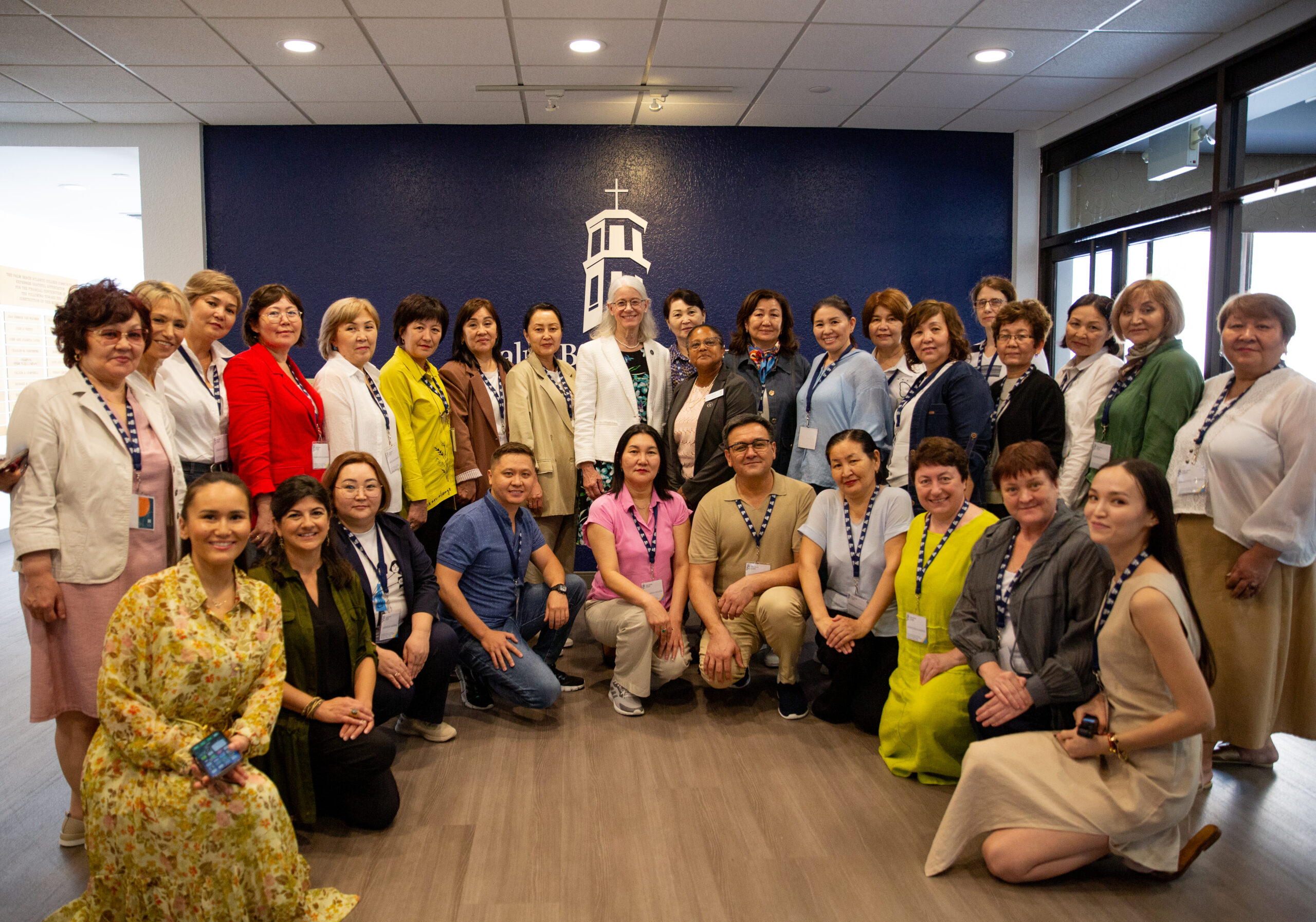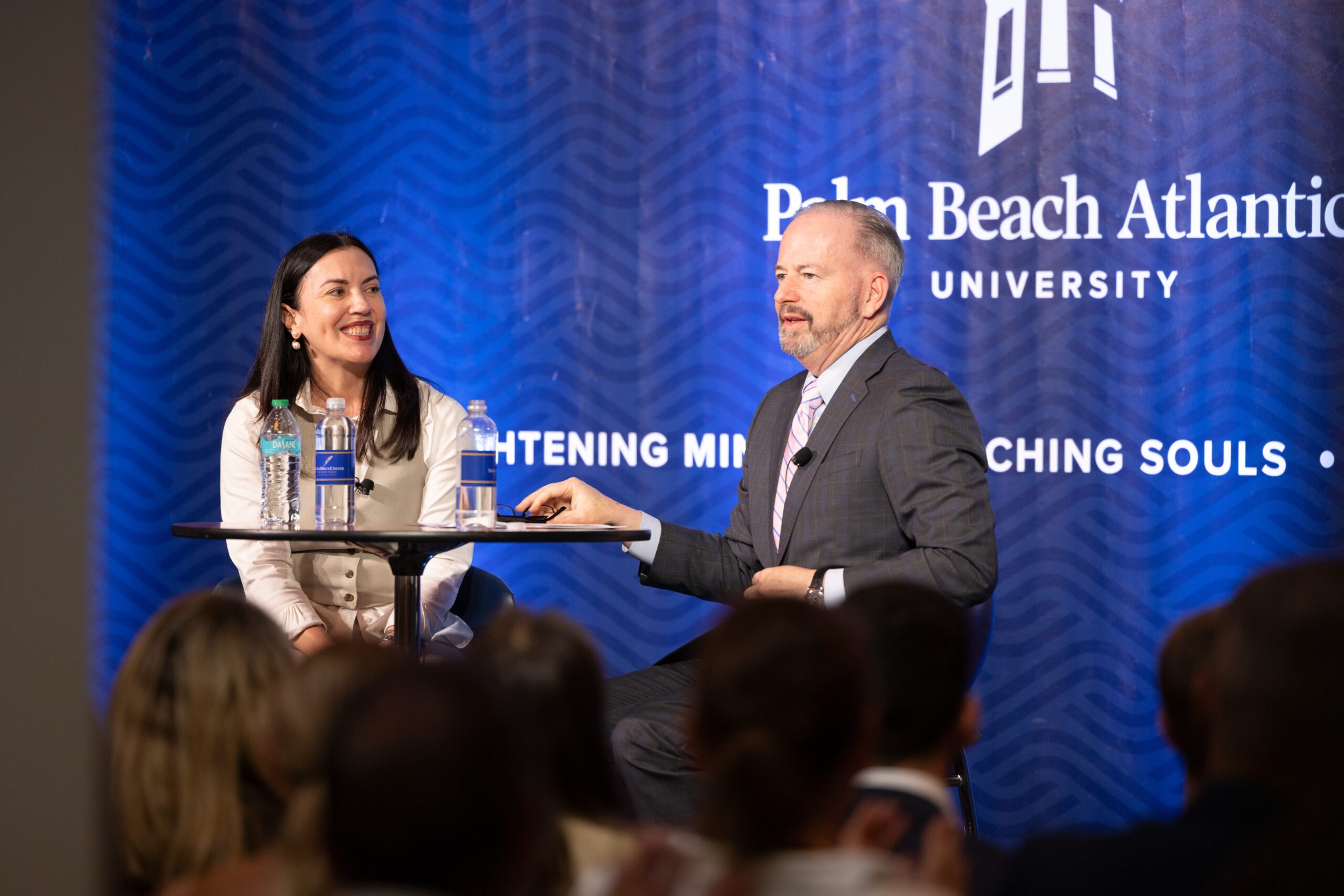Sen. George S. LeMieux introduces the Freidheim Fellows before their presentations in the DeSantis Family Chapel on Thursday, Oct. 1, 2020. Freidheim Fellows and outstanding undergraduate students Benjamin DeHaan and Maria Landron took a deep dive into two complex issues of great public importance: U.S. foreign policy and immigration policy.
They presented the findings of their research on Thursday night to a panel that included U.S. Sen. George S. LeMieux, President Dr. Debra A. Schwinn, Politics Professor Dr. Francisco Plaza, and Assistant Professor of Politics Dr. James Todd. Plaza served as Landron’s adviser, and Todd served as DeHaan’s for their 6-month-long research project.
The Freidheim Fellows program is part of the LeMieux Center for Public Policy, one of Palm Beach Atlantic’s six Centers of Excellence. It is named for donors Marguerite “Mitzi” Freidheim and her husband of 56 years, Cyrus. Fellows receive ongoing guidance from LeMieux, as well as a stipend to cover research costs and an independent study course.
The fellows’ presentations were streamed live from the DeSantis Family Chapel, with a small group of family and friends invited to watch live. LeMieux congratulated the students’ parents on raising “bright, smart, caring people who are going to do great things in this world.” Other fellows have gone on to work internationally, work in the White House or teach.
“There’s always a moment when we’re working with the students and the lightbulb goes off — and I know Ben and Maria had that moment,” he said. “This fellows program gives students a taste of what it’s like to impact public policy.”
Benjamin DeHaan, a senior business management major from Grand Rapids, Michigan, presents his research on NATO.DeHaan, a senior from Grand Rapids, Michigan, who is studying business management, researched the topic “NATO Revisited: Analysis of U.S. Foreign Policy.” NATO, formally called the North Atlantic Treaty Organization, was formed in the aftermath of World War II to deter the spread of communism as the Soviet Union grew in power. The alliance was vitally important during the Cold War, DeHaan said.
However, since the collapse of the Soviet Union, there are legitimate questions about NATO’s effectiveness, he said. The alliance has nearly doubled in size since the end of the Cold War, and the member countries are so small in terms of geography and economic power that they rely on the security the U.S. provides, DeHaan said.
DeHaan pointed to three case studies to illustrate his point. One such case was NATO’s involvement in Afghanistan in response to the terrorist attacks on the U.S. on Sept. 11, 2001. It was the first time the alliance enacted Article 5, which articulates that if one member is attacked, every member will consider it an attack on them all.
“Everyone was surprised that the first time this was invoked was to come to the aid of the United States,” DeHaan said.
Adding to the challenge, NATO was created to combat an ideology — specifically communism — that was attached to a fixed state. It was not equipped to combat pockets of radical Islamic terrorism around the world, DeHaan said. When Afghanis asked for more support, it was often the U.S. that ended up contributing more, DeHaan said.
DeHaan closed with three recommendations: NATO should stop adding members or slow down expansion until there’s a better strategy in place; overwhelming U.S. responsibilities should be shifted to European Allies; and the alliance must have a more global approach. Specifically, China needs to be viewed as the threat that it is, DeHaan said.
As part of his research, DeHaan interviewed a former ambassador to NATO who served under the Obama administration. “It was an incredible experience,” DeHaan said.
Freidheim Fellow Maria Landron, a senior public relations major, presents her research on U.S. immigration policy, on Thursday, Oct. 1, in the DeSantis Family Chapel. Her adviser, Politics Professor Dr. Francisco Plaza, looks on.Landron, a senior public relations major from Royal Palm Beach, titled her research “Beyond the Wall: Mexico and Central America.” She took a comprehensive look at U.S. immigration policy, which many Americans mistake as merely a wall at the southern border, she said.
In December, Landron and another student, Madison Stoneburner, visited the Mexico-Arizona border for a public relations campaigns course. They interviewed law enforcement officials who have had success fighting illegal immigration, as well as nonprofit groups that help trafficked women and cattle ranchers who are deeply affected.
Illegal immigration is both a national security issue and a humanitarian crisis, Landron said. She noted that thousands of children arrive at the southern border every year, many of them making the long trek from Honduras, Guatemala and El Salvador without any parent or family member accompanying them.
For prospective immigrants who survive the journey, they face a backlog in the U.S. immigration system and a low likelihood of their asylum claims being approved, Landron said.
Humanitarian aid provides some relief to the immigrants, Landron said. As to the security threat, the United States has established agreements with Honduras, Guatemala and El Salvador to share data to ensure that migrants entering the U.S. don’t have criminal records.
The legality of the U.S.’ Migrant Protection Protocols — which require certain migrants to return to Mexico for the duration of their immigration proceedings — has been questioned. Human rights agencies have criticized the protocols for placing refugees in danger, Landron said.
Landron suggested the U.S. reframe its immigration policy so that citizens understand that the policy is more than just a wall and other countries view the U.S. as a helper rather than an antagonist.
Landron’s other recommendations included revising asylum programs and focusing on economic development in the nations from which migrants are fleeing because they lack other choices. Transnational crime organizations can play off of the weak economies, posing a threat to the U.S.
“One can only imagine how this pandemic has affected the already struggling economies of Mexico, Guatemala, Honduras and El Salvador,” Landron said. “This is strategic.”



